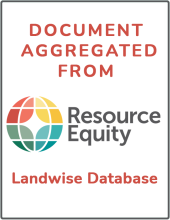Land Library Search
Through our robust search engine, you can search for any item of the over 73,000 highly curated resources in the Land Library.
If you would like to find an overview of what is possible, feel free to peruse the Search Guide.
/ library resources
Showing items 1 through 9 of 45.The position paper provides an updated insight on the role that urban agriculture can play in pursuing the Millennium Development Goals and more specifically MDG 1 and 7, related to poverty reduction, food security, and environmental sustainability.
This report for GTZ, published in May 2008, analyses the potentials and risks of Jatropha plantation. With regards to land issues, it highlights the risks of land degradation and intransparent investment and lists a number of large-scale investors.
Dar es Salaam is one of the fastest growing cities in sub-Saharan Africa. In its rapidly expanding peri-urban fringe poor migrants from distant rural areas settle down on plots they can afford that provide access to urban markets.
In many developing countries, supermarkets are growing fast. This growth entails a change in the food chain that supplies fresh foods from farmers and processed foods via agroprocessors. Farmers who wish to participate in the food chain have to adapt to the supermarkets' requirements.
This report details the findings of a round table discussion on land reform and agricultural development in South Africa convened by The Centre for Development and Enterprise (CDE) in October 2007.
Contract farming is seen by proponents as a way to raise small-farm income by delivering technology and market information to small farmers, incorporating them into remunerative new markets.
Although Cambodia has made significant progress in improving human well-being, poverty in rural areas persists. This Human Development Report for Cambodia assesses the state of rural livelihoods and their relationship with natural resources.
ABSTRACTED FROM THE SUMMARY: The impact of land titles on social and economic development and poverty reduction in the rural sector can be optimized by targeting land-titling efforts in areas where government agencies, NGOs, and private investors are actively engaged.






